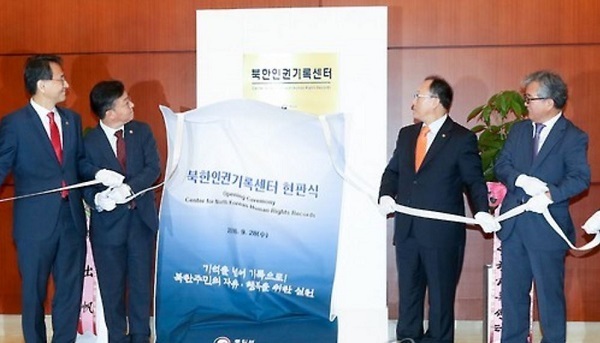South Korea's unification ministry on Tuesday unveiled a three-year plan to improve North Korea's human rights situation including efforts to get its people access to outside information.
The Ministry of Unification set up the initial plan which will run from this year through 2019 in line with the country's law aimed at improving North Korea's human right situation that went into effect in September last year, government officials said.
 |
This photo, taken on Sept. 28, 2016, shows Unification Minister Hong Yong-pyo (2nd from L) attending a ceremony to open the Center for North Korean Human Rights Records, an agency to investigate and collect data on Pyongyang's rights situation. (Yonhap) |
"The government views enhancement of North Korea's human rights as a major factor in crafting a unification policy," the ministry said in a statement.
"Seoul will seek to induce North Korea to protect and improve human rights by taking the dual-track approaches of employing pressure and strategic engagement such as inter-Korean dialogue on the rights issue," it said.
North Korea has long been labeled one of the worst human rights violators in the world. The North does not tolerate dissent, holds hundreds of thousands of people in political prison camps and keeps tight control over outside information.
Under the law, the government launched an agency to investigate and collect data on Pyongyang's rights situation.
But the government has yet to launch a foundation to support relevant civic groups' activities and do research on Pyongyang's human rights record due to a delay of the parliamentary process to file candidates for board members.
The three-year blueprint contained seven policy goals including helping North Koreans get access to outside information, the ministry said.
"The government plans to help guarantee North Koreans the rights to know," it said. "(Seoul will make efforts) to help North Koreans contact the outside world and increase the inflow of outside information to the North."
The government earlier said that it will push for projects that will help raise North Koreans' accessibility to outside information if the foundation is launched.
But Seoul said it won't support civic groups that send up anti-Pyongyang leaflets via balloons, one of the main sources of tensions between the two Koreas.
North Korea is sensitive to Seoul activists' move to send anti-Pyongyang propaganda leaflets and does not want ordinary North Koreans to know the truth about its repressive regime.
The government also said that it will push for providing humanitarian assistance to vulnerable people including infants and pregnant women.
Seoul will seek to hold inter-Korean dialogue on human rights to get North Korea to change its course. It plans to encourage North Korea to accept the talks by offering technical cooperation in the human rights field.
Detailed action plans to implement the blueprint are expected to be drawn up under the next administration following the May 9 presidential election, the ministry added. (Yonhap)







![[Today’s K-pop] Blackpink’s Jennie, Lisa invited to Coachella as solo acts](http://res.heraldm.com/phpwas/restmb_idxmake.php?idx=644&simg=/content/image/2024/11/21/20241121050099_0.jpg)
